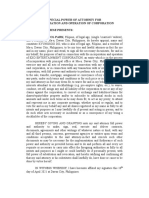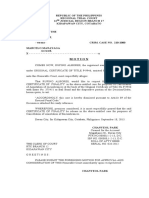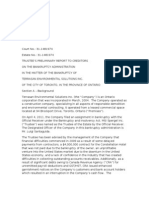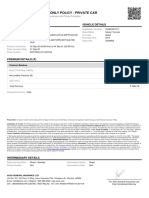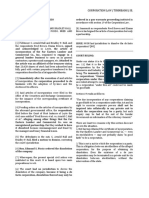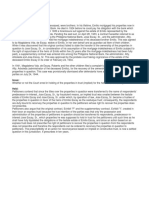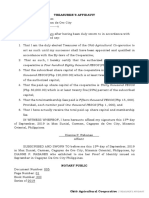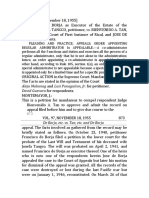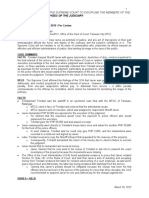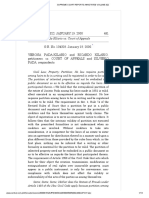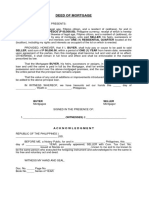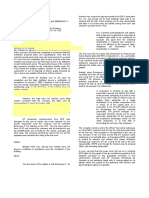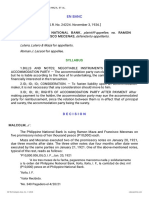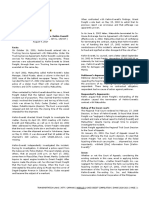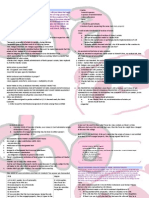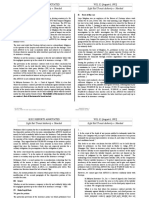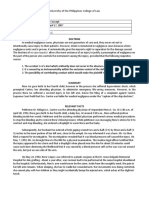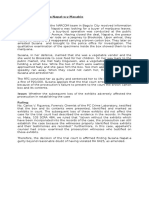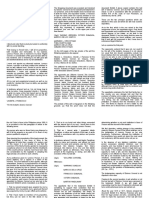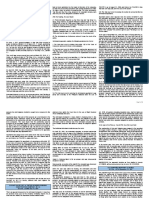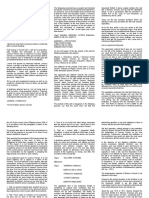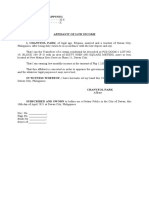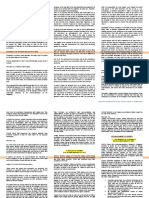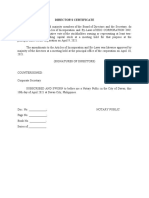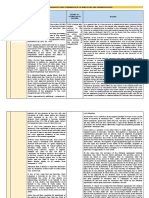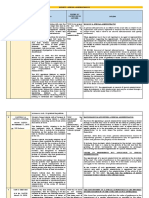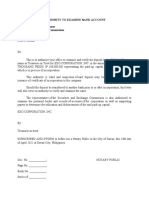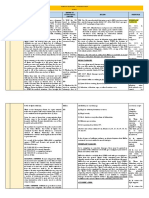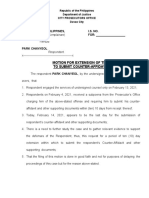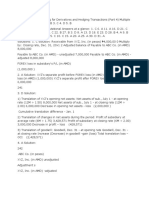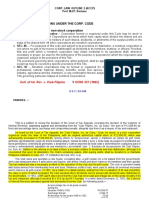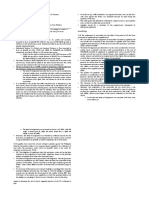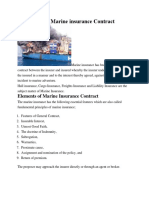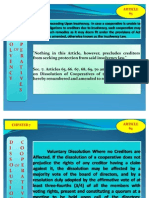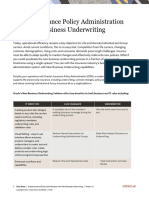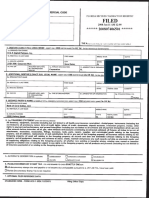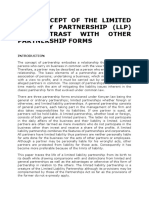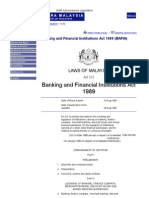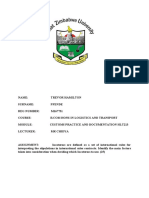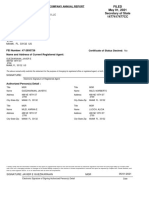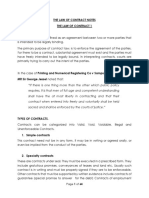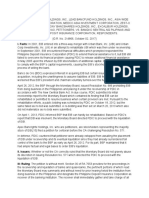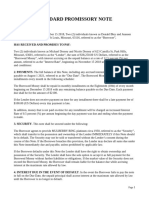AGENCY Obligations of The Agent
AGENCY Obligations of The Agent
Uploaded by
ALEXANDRIA RABANESCopyright:
Available Formats
AGENCY Obligations of The Agent
AGENCY Obligations of The Agent
Uploaded by
ALEXANDRIA RABANESOriginal Title
Copyright
Available Formats
Share this document
Did you find this document useful?
Is this content inappropriate?
Copyright:
Available Formats
AGENCY Obligations of The Agent
AGENCY Obligations of The Agent
Uploaded by
ALEXANDRIA RABANESCopyright:
Available Formats
1. PHILIPPINE NATIONAL BANK, petitioner, vs. MANILA attempted to do so.
It must not be forgotten that the Bank's power to
SURETY and FIDELITY CO., INC. and THE COURT OF collect was expressly made irrevocable, so that the Bureau of Public
APPEALS (Second Division), respondents. Works could very well refuse to make payments to the principal
debtor itself, and a fortiori reject any demands by the surety.
G.R. No. L-20567 July 30, 1965
The fact remains that because of the Bank's inactivity the other
FACTS: The Philippine National Bank had opened a letter of credit creditors were enabled to collect P173,870.31, when the balance due
and advanced thereon $120,000.00 to Edgington Oil Refinery for to appellant Bank was only P158,563.18. The finding of negligence
8,000 tons of hot asphalt. Of this amount, 2,000 tons worth made by the Court of Appeals is thus not only conclusive on us but
P279,000.00 were released and delivered to Adams & Taguba fully supported by the evidence.
Corporation (known as ATACO) under a trust receipt guaranteed by
Manila Surety & Fidelity Co. up to the amount of P75,000.00. To pay 2. CONSOLACION L. RAMOS, administratrix-appellant,
for the asphalt, ATACO constituted the Bank its assignee and
attorney-in-fact to receive and collect from the Bureau of Public vs. BENIGNO A. CAOIBES, attorney-in-fact-appellee.
Works the amount aforesaid out of funds payable to the assignor
under Purchase Order No. 71947. G.R. No. L-5142 February 26, 1954
FACTS: Concepcion Ramos died on August 19, 1948, leaving a will
ATACO delivered to the Bureau of Public Works, and the latter
dated January 7, 1927 admitted to probate on October 4, 1948, in
accepted, asphalt to the total value of P431,466.52. Of this amount
which she ordered that the credits due to her be distributed among the
the Bank regularly collected, from April 21, 1948 to November 18,
children of the deceased Antonino Ramos, namely, Consolacion,
1948, P106,382.01. Thereafter, for unexplained reasons, the Bank
Ramon, Socorro and Cirila.
ceased to collect, until in 1952 its investigators found that more
moneys were payable to ATACO from the Public Works office,
One year before she died, Concepcion Ramos filed with the War
because the latter had allowed mother creditor to collect funds due to
Damage Commission a claim and on August 31, 1948, the
ATACO under the same purchase order to a total of P311,230.41.
Commission issued check in the amount of P501.62, payable to the
deceased Concepcion Ramos. This check was returned to the
Its demands on the principal debtor and the Surety having been
Commission and substituted by the latter which check No. 564614,
refused, the Bank sued both in the Court of First Instance of Manila
on November 10, 1948, for the same amount, but payable to Benigno
to recover the balance of P158,563.18 as of February 15, 1950, plus
A. Caoibes, who had presented to said entity a power of attorney and
interests and costs.
1 a document
AGENCY: of donation bothof the
Obligations executed
Agentby Concepcion
(Arts. Ramos
1884 to 1909)
Dipusoy in order to exchange the first check No. 564614, which he
CA: found the Bank to have been negligent in having stopped
cashed for himself.
collecting from the Bureau of Public Works the moneys falling due in
favor of the principal debtor, ATACO, from and after November 18,
The said documents were presented to the Commission by Caoibes
1948, before the debt was fully collected, thereby allowing such
after the death of Concepcion. The administratrix, Consolacion L.
funds to be taken and exhausted by other creditors to the prejudice of
Ramos, the appellant herein, discovered the collection made by
the surety, and held that the Bank's negligence resulted in exoneration
Caoibes when she saw the note "previous payment" which appeared
of respondent Manila Surety & Fidelity Company.
in the account sent to her by the Commission on October 13, 1950.
She filed a motion with the court asking that Caoibes be ordered to
Bank: It contends the power of attorney obtained from ATACO was
deposit the sum of P501.62 with the clerk of court. Caoibes answered
merely in additional security in its favor, and that it was the duty of
the motion admitting that after the death of Concepcion, he presented
the surety, and not that of the creditor, owed see to it that the obligor
the documents to the Commission and received in cash the sum of
fulfills his obligation, and that the creditor owed the surety no duty of
P501.62, amount of the second check, above mentioned, but stating
active diligence to collect any, sum from the principal debtor.
that he was willing to deliver to the clerk the sum of P250.81. He
contended that, by virtue of the said documents, he had the right to
ISSUE: Bank liable for neglect in collecting sums due its debtor.
retain, for himself, half of the sum of P501.62.
RULING: Yes.
ISSUE: WON Caoibes, as an agent has the obligation to deliver the
amount collected by him by virtue of said power to the administratrix
The Court of Appeals did not hold the Bank answerable for
of the estate of his principal.
negligence in failing to collect from the principal debtor but for its
neglect in collecting the sums due to the debtor from the Bureau of
RULING: Yes.
Public Works, contrary to its duty as holder of an exclusive and
irrevocable power of attorney to make such collections, since an
Caoibes, as agent, had the obligation to deliver the amount collected
agent is required to act with the care of a good father of a family
by virtue of said power to his principal, Concepcion, or, after her
(Civ. Code, Art. 1887) and becomes liable for the damages which the
death, to the administratrix of her estate, Consolacion. There is
principal may suffer through his non-performance (Civ. Code, Art.
absolutely no cession of rights made in favor of Caoibes in the
1884). Certainly, the Bank could not expect that the Bank would
execured power of attorney, and under Article 1711 of the old Civil
diligently perform its duty under its power of attorney, but because
Code (which was in force at the time of the transaction), the contract
they could not have collected from the Bureau even if they had
of agency is presumed to be gratuitous, unless the agent is a
Cases from the discussions of Atty. Princess Claudin C. Omelio-Balino
professional agent. There is no proof that Caoibes was such. The whole case as presented, both by the oral testimony and the
Furthermore, according to Article 1732 of said Code, an agency is exhibits, demonstrates beyond shadow of doubt that the plaintiff was
terminated, among other causes, by the death of the principal or of acting as the agent of the defendant in placing the insurance upon the
the agent. When Caoibes made use of the power of attorney, his vessels in question and that such act redounded to its benefit. The
principal, Concepcion was already dead. idea presented in argument of counsel for appellant, that all relations
were broken off and terminated by the commencement of the action
Coming now to the affidavit, the alleged document of donation The upon the account current by the plaintiff in March, 1909, and that,
alleged donation was made in writing but it has not been accepted in therefore, the plaintiff could do nothing whatever on behalf of the
the same form, and consequently, has no validity. It cannot be defendant thereafter, wholly loses its force when we observe that, in
considered a donation upon valuable consideration, for no services reality, the plaintiff did not do anything on behalf of the defendant
nor any valuable consideration had passed from the donees to the after that time. What it did and all it did was to fulfill a contract
donor. The mere fact that Caoibes collected the claim from the War which it had made with the insurance company prior to the beginning
Damage Commission is not such a service as to require of that action. The plaintiff had secured the insurance of the two
compensation. Caoibes did not even prepare the claim. vessels during the years 1907, 1908, and 1909, and had agreed to pay
the insurance company the premiums thereon. The three contracts for
In view of the foregoing, the order appealed from is hereby reversed those years had been made by the plaintiff and it had become liable to
and Benigno A. Caoibes is ordered to deposit with the Clerk of Court fulfill the same on its part prior to the commencement of the action
of Batangas the sum of P501.62 to be at the disposal of the on the 30th of March, 1909. The payment thereafter of the insurance
administratrix in her capacity as such, without pronouncement as to premiums for those three years is no proof that the plaintiff was still
costs. exercising a relation which existed after the commencement of that
action, but indicates simply that it was completing an obligation
which it had made when that relation was admittedly in force.
4. VICENTE M. DOMINGO, represented by his heirs,
ANTONINA RAYMUNDO VDA. DE DOMINGO, RICARDO,
CESAR, AMELIA, VICENTE JR., SALVADOR, IRENE and
JOSELITO, all surnamed DOMINGO, petitioners-appellants,
vs.
GREGORIO M. DOMINGO, respondent-appellee, TEOFILO P.
PURISIMA, intervenor-respondent.
3. GUTIERREZ HERMANOS, Plaintiffs-Appellees, v. ORIA G.R. No. L-30573 October 29, 1971
2 HERMANOS, Defendants-Appellants. AGENCY: Obligations of the Agent (Arts. 1884 to 1909)
Makasiar, J.:
G.R. No. L-6485 March 17, 1911
FACTS: Vicente Domingo granted to Gregorio Domingo, a real
Moreland, J.: estate broker, the exclusive agency to sell his lot, Piedad Estate in a
document. According to the document, the said lot must be sold for
FACTS: Two vessels known as Serantes and Comillas were owned P2 per sq. m. Greg sq. m. and Gregorio is entitled to 5% commission
by defendant Oria Hermanos. Herein Plaintifff Gutierrez Hermanos on the total price of the property. Gregorio Domingo authorized
acting on or behalf of defendant obtained insurance from an Teofilo Purisima to look for a buyer without notifying Vicente.
insurance from Paris, France on two vessels, through its agents in Gregorio promised teofilo ½ of the 5% commission. Teofilo
Paris. And the insurance was continued on behalf of the defendant introduced Oscar de Leon to Gregorio as the prospective buyer.
Oria Hermanos. Plaintiff Gutierrez Hermanos faithfully paid the
insurance and charged the same against the defendant. Oscar submitted a written offer for which was very much lower than
the P2 per sq. m. price. Vicente directed Gregorio to tell Oscar to
Plaintiff now seeks to recover the amount no reference being made in raise his offer. After several conferences, Oscar raised his offer to
the complaint in that action to the sum sued for in the action at bar. P1.20 per sq. m. or P190,000 in total and Gregorio agreed to the said
What the status of that action is we do not know. Later, and on the offer. Upon Vicente’s demand, Oscar issued a P1,000 as earnest
18th of March, 1910, the plaintiff began this action for the recovery money. Vicente advanced P300 to Gregorio. Vicente asked for an
of premiums paid during the years 1907, 1908, and 1909. During additional P1000 earnest money, which Oscar promised to deliver to
these three years one of the vessels in question, the Serantes, was Vicente.
insured in the name of the plaintiff.
Oscar gave gregorio P1000 as a gift for succeeding in persuading
The defendant argued that after closing of the account and the Viente to sell his lot, but Gregorio did not disclose said gift to
commencement of the action severed all relations of every kind Vicente.
between the parties and the plaintiff had no authority to act for the
defendant.
ISSUE: Whether or not the plaintiff is the agent of the defendant?
RULING: Yes.
Cases from the discussions of Atty. Princess Claudin C. Omelio-Balino
Gregorio did not see Oscar for several weeks thus sensing that Here, defendant-appellee Gregorio Domingo as the broker, received a
something fishy might be going on. So, he went to Vicente’s house gift or propina in the amount of One Thousand Pesos (P1,000.00)
where he read a portion of the agreement that vicente was still willing from the prospective buyer Oscar de Leon, without the knowledge
to pay 5% commission. Gregorio went to the ROD where he and consent of his principal, herein petitioner-appellant Vicente
discovered that a Deed of Sale was executed by Amparo de Leon, Domingo. His acceptance of said substantial monetary gift corrupted
Oscar’s wife, in favour of Vicente. his duty to serve the interests only of his principal and undermined
his loyalty to his principal, who gave him partial advance of Three
Vicente stated that Gregorio is not entitled to the 5% commission Hundred Pesos (P300.00) on his commission. As a consequence,
because he sold the property not to Gregorio's buyer, Oscar de Leon, instead of exerting his best to persuade his prospective buyer to
but to another buyer, Amparo Diaz, wife of Oscar de Leon. purchase the property on the most advantageous terms desired by his
principal, the broker, herein defendant-appellee Gregorio Domingo,
ISSUE: Whether or not the failure on the part of Gregorio to disclose succeeded in persuading his principal to accept the counter-offer of
of the gift given to him by Oscar constitutes fraud as to cause a the prospective buyer to purchase the property at P1.20 per square
forfeiture of his commission on the sale price? meter or One Hundred Nine Thousand Pesos (P109,000.00) in round
figure for the lot of 88,477 square meters, which is very much lower
RULING: Yes. the the price of P2.00 per square meter or One Hundred Seventy-Six
Thousand Nine Hundred Fifty-Four Pesos (P176,954.00) for said lot
The duties and liabilities of a broker to his employer are essentially originally offered by his principal.
those which an agent owes to his principal.
5. U.S. vs. Reyes, 36 Phil. 791 (see separate page)
Art. 1891. Every agent is bound to render an account of his
transactions and to deliver to the principal whatever he may have 6. Villa vs. Garcia Bosque, 49 Phil. 126 (see separate page)
received by virtue of the agency, even though it may not be owing to
the principal.
7. DEVELOPMENT BANK OF THE PHILIPPINES vs. COURT
Every stipulation exempting the agent from the obligation to render OF APPEALS and the ESTATE OF THE LATE JUAN B.
an account shall be void. DANS, represented by CANDIDA G. DANS, and the DBP
MORTGAGE REDEMPTION INSURANCE POOL
Art. 1909. The agent is responsible not only for fraud but also for
negligence, which shall be judged with more less rigor by the courts, G.R. No. L-109937, March 21, 1994
3 according to whether the agency was or was not for a compensation. AGENCY: Obligations of the Agent (Arts. 1884 to 1909)
FACTS: In May 1987, Juan B. Dans, together with his wife Candida,
The aforecited provisions demand the utmost good faith, fidelity, his son and daughter-in-law, applied for a loan of P500,000.00 with
honesty, candor and fairness on the part of the agent, the real estate the DBP. As the principal mortgagor, Dans, then 76 years of age, was
broker in this case, to his principal, the vendor. The law imposes advised by DBP to obtain a mortgage redemption insurance (MRI)
upon the agent the absolute obligation to make a full disclosure or with the DBP Mortgage Redemption Insurance Pool (DBP MRI
complete account to his principal of all his transactions and other Pool).
material facts relevant to the agency, so much so that the law as
amended does not countenance any stipulation exempting the agent A loan, in the reduced amount of P300,000.00, was approved and
from such an obligation and considers such an exemption as void. released by DBP. From the proceeds of the loan, DBP deducted the
The duty of an agent is likened to that of a trustee. This is not a amount of P1,476.00 as payment for the MRI premium. The MRI
technical or arbitrary rule but a rule founded on the highest and truest premium of Dans, less the DBP service fee of 10 percent, was
principle of morality as well as of the strictest justice.2 credited by DBP to the savings account of the DBP MRI Pool.
Accordingly, the DBP MRI Pool was advised of the credit.
Hence, an agent who takes a secret profit in the nature of a bonus,
gratuity or personal benefit from the vendee, without revealing the On September 3, 1987, Dans died of cardiac arrest. The DBP, upon
same to his principal, the vendor, is guilty of a breach of his loyalty notice, relayed this information to the DBP MRI Pool. On September
to the principal and forfeits his right to collect the commission from 23, 1987, the DBP MRI Pool notified DBP that Dans was not eligible
his principal, even if the principal does not suffer any injury by for MRI coverage, being over the acceptance age limit of 60 years at
reason of such breach of fidelity, or that he obtained better results or the time of application.
that the agency is a gratuitous one, or that usage or custom allows it;
because the rule is to prevent the possibility of any wrong, not to DBP apprised Candida Dans of the disapproval of her late husband's
remedy or repair an actual damage.3 By taking such profit or bonus MRI application. The DBP offered to refund the premium of
or gift or propina from the vendee, the agent thereby assumes a P1,476.00 which the deceased had paid, but Candida Dans refused to
position wholly inconsistent with that of being an agent for his accept the same, demanding payment of the face value of the MRI or
principal, who has a right to treat him, insofar as his commission is an amount equivalent to the loan. She, likewise, refused to accept an
concerned, as if no agency had existed. The fact that the principal ex gratia settlement of P30,000.00, which the DBP later offered.
may have been benefited by the valuable services of the said agent
does not exculpate the agent who has only himself to blame for such ISSUES:
a result by reason of his treachery or perfidy.
Cases from the discussions of Atty. Princess Claudin C. Omelio-Balino
1. WON DBP MRI Pool be held liable for the which he assumes to act. Inasmuch as the non-
transaction. disclosure of the limits of the agency carries with
it the implication that a deception was perpetrated
2. WON DBP is liable for the transaction. on the unsuspecting client, the provisions of
Articles 19, 20 and 21 of the Civil Code of the
RULING: Philippines come into play.
1. NO. DBP MRI Pool cannot be held liable on a
contract that does not exist.
8. PHILIPPINE PRODUCTS COMPANY vs. PRIMATERIA
The power to approve MRI applications is lodged SOCIETE ANONYME POUR LE COMMERCE EXTERIEUR:
with the DBP MRI Pool. The pool, however, did PRIMATERIA (PHILIPPINES) INC., ALEXANDER G.
not approve the application of Dans. There is BAYLIN and JOSE M. CRAME
also no showing that it accepted the sum of
P1,476.00, which DBP credited to its account G.R. No. L-17160, November 29, 1965
with full knowledge that it was payment for
Dan's premium. There was, as a result, no FACTS: Defendant Primateria Societe Anonyme Pour Le Commerce
perfected contract of insurance. Exterieur (hereinafter referred to as Primateria Zurich) is a foreign
juridical entity and, at the time of the transactions involved herein,
2. YES. DBP is liable. had its main office at Zurich, Switzerland. It was then engaged in
"Transactions in international trade with agricultural products,
In dealing with Dans, DBP was wearing two particularly in oils, fats and oil-seeds and related products."
legal hats: the first as a lender, and the second as
an insurance agent. On October 24, 1951, Primateria Zurich, through defendant
Alexander B. Baylin, entered into an agreement with plaintiff
As an insurance agent, DBP made Dans go Philippine Products Company, whereby the latter undertook to buy
through the motion of applying for said copra in the Philippines for the account of Primateria Zurich. Plaintiff
insurance, thereby leading him and his family to caused the shipment of copra to foreign countries, pursuant to
believe that they had already fulfilled all the instructions from defendant Primateria Zurich, thru Primateria (Phil.)
requirements for the MRI and that the issuance of Inc., acting by defendant Alexander G. Baylin and Jose M. Crame,
4 their policy was forthcoming. Apparently, DBP officersAGENCY: Obligations
of said corporation. Asofa the Agent
result, (Arts.amount
the total 1884 to 1909)
due to the
had full knowledge that Dan's application was plaintiff as of May 30, 1955, was P33,009.71.
never going to be approved.
There is no question that Alexander G. Baylin and Primateria
The DBP is not authorized to accept applications Philippines acted as the duly authorized agents of Primateria Zurich
for MRI when its clients are more than 60 years in the Philippines. It is likewise undisputed that Primateria Zurich
of age. Knowing all the while that Dans was had no license to transact business in the Philippines.
ineligible for MRI coverage because of his
advanced age, DBP exceeded the scope of its The trial court held that defendant Primateria Zurich is liable for the
authority when it accepted Dan's application for whole amount, with legal interest and attorney’s fees. It also absolved
MRI by collecting the insurance premium, and defendants Primateria (Phil.), Inc., Alexander G. Baylin, and Jose M.
deducting its agent's commission and service fee. Crame from any and all liability.
The liability of an agent who exceeds the scope Plaintiff alleges that the appellees as agents of Primateria Zurich are
of his authority depends upon whether the third liable to it under Art. 1897 of the New Civil Code which reads as
person is aware of the limits of the agent's follows:
powers. There is no showing that Dans knew of
the limitation on DBP's authority to solicit Art. 1897. The agent who acts as such is not personally
applications for MRI. liable to the party with whom he contracts, unless he
expressly binds himself or exceeds the limits of his
If the third person dealing with an agent is authority without giving such party sufficient notice of his
unaware of the limits of the authority conferred powers.
by the principal on the agent and he (third
person) has been deceived by the non-disclosure ISSUE: WON its agents may be held personally liable on contracts
thereof by the agent, then the latter is liable for made in the name of the entity with third persons in the Philippines.
damages to him. The rule that the agent is liable
when he acts without authority is founded upon RULING: NO. The agents cannot be held personally liable.
the supposition that there has been some wrong
or omission on his part either in misrepresenting, We do not see how the plaintiff could recover from both the principal
or in affirming, or concealing the authority under (Primateria Zurich) and its agents. It has been given judgment against
Cases from the discussions of Atty. Princess Claudin C. Omelio-Balino
the principal for the whole amount. It asked for such judgment, and Same; Same; Same; The rule in Art. 1403 of the Civil Code that a
did not appeal from it. It clearly stated that its appeal concerned the contract entered into by an agent beyond his authority is
other three defendants. unenforceable does not apply where the contract is being enforced
as to damages against the agent itself for doing what it did without
authority.—We hold that defendants' contention is untenable because
There is no proof that, as agents, they exceeded the limits of their article 1403 refers to the unenforceability of the contract against the
authority. In fact, the principal — Primateria Zurich — who should principal. In the instant case, the contract containing the stipulation
be the one to raise the point, never raised it, denied its liability on the for liquidated damages is not being enforced against its principal but
ground of excess of authority. At any rate, Article 1897 does not hold against the agent and its surety.
that in cases of excess of authority, both the agent and the principal
are liable to the other contracting party. Same; Same; Same; Same.—It is being enforced against the agent
because article 1897 implies that the agent who acts in excess of his
authority is personally liable to the party with whom he contracted.
And that rule is complemented by article 1898 of the Civil Code
which provides that "if the agent contracts in the name of the
9. NATIONAL POWER CORPORATION (NAPOCOR) vs. principal, exceeding the scope of his authority, and the principal does
NATIONAL MERCHANDISING CORPORATION not ratify the contract, it shall be void if the party with whom the
(NAMERCO) and DOMESTIC INSURANCE COMPANY OF agent contracted is aware of the limits of the powers granted by the
THE PHILIPPINES principal".
Nos. L-33819 and L-33897. October 23, 1982 Same; Same; Same; An agent must disclose the limits of its
authority to avoid personal liability for ultra vires contracts.—
ESCRA: Namerco never disclosed to the NPC the cabled or written
instructions of its principal. For that reason and because Namerco
An agent which does not disclose to a third person wishing to exceeded the limits of its authority, it virtually acted in its own name
purchase crude sulfur from its principal, that the principal told it and not as agent and it is, therefore, bound by the contract of sale
via cable that it should not sign the sales contract unless it wish to which, however, is not enforceable against its principal. If, as
assume sole responsibility for the shipment, exceeds the limits of its contemplated in articles 1897 and 1898, Namerco is bound under the
authority in subsequently signing the contract.—We agree with the contract of sale, then it follows that it is bound by the stipulation for
trial court that Namerco is liable for damages because under article liquidated damages in that contract.
1897 of the Civil Code the agent who exceeds the limits of his
authority without giving the party with whom he contracts sufficient Agency; Bonds; Contracts; A surety company which guaranteed
notice of his powers is personally liable to such party. The truth is performance of foreign principal of a domestic agent is liable on its
that even before the contract of sale was signed Namerco was already guarantee to the party with which the local agent dealt with in
5 aware that its principal was having difficulties in booking shipping excessAGENCY: Obligations
of its authority, as saidof the Agent
agent (Arts.acted
virtually 1884 as
to 1909)
its own
space. In a cable dated October 16, 1956, or one day before the principal.—Another contention of the defendants is that the
contract of sale was signed, the New York supplier advised Namerco Domestic Insurance Company is not liable to the NPC because its
that the latter should not sign the contract unless it (Namerco) wished bond was posted, not for Namerco, the agent, but for the New York
to assume sole responsibility for the shipment. firm which is not liable on the contract of sale. That contention
cannot be sustained because it was Namerco that actually solicited
Same; Same; Same; Same.—Sycip, Namerco's president, replied in the bond from the Domestic Insurance Company and, as explained
his letter to the seller dated also October 16, 1956, that he had no already, Namerco is being held liable under the contract of sale
choice but to finalize the contract of sale because the NPC would because it virtually acted in its own name. It became the principal in
forfeit Namerco's bidder's bond in the sum of P45,100 posted by the the performance bond. In the last analysis, the Domestic Insurance
Domestic Insurance Company if the contract was not formalized. Company acted as surety for Namerco.
Three days later, or on October 19, the New York firm cabled
Namerco that the firm did not consider itself bound by the contract of Same; Same; Same; Same.—The rule is that "want of authority of
sale and that Namerco signed the contract on its own responsibility. the person who executes an obligation as the agent or representative
of the principal will not, as a general rule, affect the surety's liability
Same; Same; Same; The rule that a person dealing with an agent thereon, especially in the absence of fraud, even though the
must inquire into the limits of the agent's authority does not apply obligation is not binding on the principal" (72 C.J.S. 525).
where the agent is being held directly responsible for taking
chances in exceeding its authority.—That is not so in this case. AQUINO, J.:
Here, it is the agent that is sought to be held liable on a contract of
sale which was expressly repudiated by the principal because the FACTS:
agent took chances, it exceeded its authority, and, in effect, it acted in
its own name. As observed by Castan Tobeñas, an agent "que haya
Plaintiff: National Power Corporation (NAPOCOR, for brevity)
traspasado los limites del mandato, lo que equivale a obrar sin
mandato" (4 Derecho Civil Español, 8th Ed., 1956, p. 520).
Defendant: National Merchandising Corporation (NAMERCO, for
brevity) and Domestic Insurance Company
Same; Same; Same; An agent who exceeds his authority is
personally liable for damages.—Manresa says that the agent who
exceeds the limits of his authority is personally liable "porque Case: recovery of liquidated damages from a seller's agent that
realmente obra sin poderes" and the third person who contracts with allegedly exceeded its authority in negotiating the sale.
the agent in such a case would be defrauded if he would not be
allowed to sue the agent (11 Codigo Civil, 6th Ed., 1972, p. 725). Timeline:
October 17, 1956 – A contract of sale was executed.
Cases from the discussions of Atty. Princess Claudin C. Omelio-Balino
Parties: GRAND TOTAL: P360,572.80.
NAPOCOR – buyer; and
NAMERCO (as PH Representative of New York, USA-based November 5, 1957 – NAPOCOR sued the New York firm, Namerco
International Commodities Corporation) – seller and the Domestic Insurance Company for the recovery of the
stipulated liquidated damages. (Civil Case No. 33114)
Subject Matter of the Sale: four thousand long tons of crude
sulfur for its Maria Cristina Fertilizer Plant in Iligan City January 17, 1958 – Trial court dismissed the case as to the New
York firm for lack of jurisdiction because it was not doing business in
Contract Price: Php 450,716.00 the Philippines. After the International Commodities Corporation
(NYC corporation) was dropped as a defendant in Civil Case No.
Performance Bond: P90,143.20 executed by Domestic 33114, Melvin Wallick (NYC Corpo assignee) sued NAMERCO for
Insurance Company, in favor of NAPOCOR to guarantee damages in connection with the same sulfur transaction (Civil Case
NAMERCO obligations. No. 37019).
Stipulations: Trial Court’s Decision:
NAMERCO would deliver the sulfur at Iligan City within sixty
days from notice of the establishment in its favor of a letter of Civil Case No. 37019 - dismissed Wallick's action for damages
credit for $212,120 against NAMERCO because the assignment in favor of Wallick was
champertous in character.
Failure to effect delivery would subject NAMERCO and its
surety (Domestic Insurance) to the payment of liquidated ● Wallick appealed to this Court. The appeal was dismissed
damages at the rate of two-fifth of one percent of the full because the record on appeal did not disclose that the
contract price for the first thirty days of default and four-fifth of appeal was perfected on time.
one percent for every day thereafter until complete delivery is
made. Civil Case No. 33114 - although the records on appeal were
approved in 1967, inexplicably, they were elevated to this Court in
November 12, 1956 – Via letter, NAPOCOR advised NAMERCO’s 1971. That anomaly initially contributed to the delay in the
President, John Z. Sycip, of the opening on November 8 of a letter of adjudication of this case.
credit for $212,120, in favor of International Commodities
Corporation and would expire on January 31, 1957.
November 15, 1956 - Notice of that letter of credit was received by October 10, 1966 - NAPOCOR appealed on questions of law from
cable by the New York firm. Deadline for the delivery of the sulfur the decision of CFI of Manila, ordering NAMERCO and Domestic
6 was January 15, 1957. AGENCY:
Insurance Company Obligations of the Agent
of the Philippines to pay: (Arts. 1884 to 1909)
- solidarity to the NAPOCOR reduced liquidated
January 20 to 26, 1957 - There was a shutdown of the NPC's damages in the sum of P72,114.56
fertilizer plant because there was no sulfur. No fertilizer was - legal rate of interest from the filing of the complaint
produced. The New York supplier was not able to deliver the sulfur - costs of the suit.
due to its inability to secure shipping space.
NAMERCO and Domestic Insurance Company of the Philippines
February 27, 1957 – Via letter, NAPOCOR General Manager appealed from the same decision because it is contrary to law and the
advised NAMERCO and Domestic Insurance Company that it would evidence.
resort to legal remedies to enforce its rights. Under Article 9 of their
contract of sale "nonavailability of bottom or vessel" was not a MAIN CONTENTIONS:
fortuitous event that would excuse nonperformance.
NAMERCO & Domestic Insurance: it was incumbent upon
May 8, 1957 – Via letter to NAMERCO President Sycip, the NAPOCOR to inquire into the extent of the agent's authority and, for
Government Corporate Counsel rescinded the contract of sale due to its failure to do so, it could not claim any liquidated damages which,
the New York supplier's nonperformance of its obligations. according to the defendants, were provided for merely to make the
seller more diligent in looking for a steamer to transport the sulfur.
June 8, 1957 - Via letter to NAMERCO President Sycip, the
Government Corporate Counsel demanded from Namerco the NAMERCO appealed and they contend that the delivery of the
payment of P360,572.80 as liquidated damages. He explained that sulfur was conditioned on the availability of a vessel to carry the
time was of the essence of the contract. A similar demand was made shipment and that Namerco acted within the scope of its
upon the surety. authority as agent in signing the contract of sale.
Computation of the Liquidated Damages & Basis: The 115- NAPOCOR: NAMERCO should have advised NAPOCOR of the
day period between January 15, 1957 (delivery deadline) limitations on its authority to negotiate the sale.
and May 9, 1957 (when Namerco was notified of the
rescission of the contract) ISSUE:
First 30 days: Contract price x 0.01, then divide by 5, then 1. WON NAMERCO acted beyond the bounds of its
multiply by 2, then multiply by 30. (TOTAL: P54,085.92) authority, thus liable for damages.
2. WON Article 1403 of the Civil Code which provides that a
Remaining 85 days: Contract price x 0.01, then divide by contract entered into in the name of another person by one
5, then multiply by 4, then multiply by 85. (TOTAL: who has acted beyond his powers is unenforceable.
P306,486.88)
Cases from the discussions of Atty. Princess Claudin C. Omelio-Balino
RULING: ● Article 1898 - "if the agent contracts in the name of the
principal, exceeding the scope of his authority, and the
Issue 1: YES, acted beyond powers. principal does not ratify the contract, it shall be void if the
party with whom the agent contracted is aware of the limits
NAMERCO (agent) violated and did not follow ICC’s (principal) of the powers granted by the principal".
cabled instructions, dated August 9, 1956, to wit:
● sale must be subject to availability of a steamer Agent here acted in excess of his authority. The NPC was unaware
(NAMERCO did not disclose to NPC that the NYC-based of the limitations on the powers granted by the New York firm to
ICC is having difficulties in booking shipping space) Namerco. Namerco never disclosed to the NPC the cabled or written
instructions of its principal. For that reason and because Namerco
● Namerco should not sign the contract unless it (Namerco) exceeded the limits of its authority, it virtually acted in its own name
wished to assume sole responsibility for the shipment and not as agent and it is, therefore, bound by the contract of sale
which, however, is not enforceable against its principal.
● Contrary to ICC’s instruction, NAMERCO agreed that
nonavailability of a steamer was not a justification for Therefore, NAMERCO is personally liable to the party with whom
nonpayment of the liquidated damages. he contracted.
● delivery of the sulfur should be "C & F Manila", not "C & Resolutory Portion: Lower court's judgment is modified and
F Iligan City" defendants National Merchandising Corporation and Domestic
Insurance Company of the Philippines are ordered to pay solidarity to
● the seller should be allowed to withdraw right away the full the National Power Corporation the sum of P45,100.00 as liquidated
amount of the letter of credit and not merely eighty percent damages. No costs.
thereof
NAMERCO is liable for damages. Under Art. 1897 of the Civil
Code, the agent who exceeds the limits of his authority without
giving the party with whom he contracts sufficient notice of his
powers is personally liable to such party. Despite constant
reminders, Sycip, Namerco's president, replied that he had no choice
but to finalize the contract of sale because the NPC would forfeit
Namerco's bidder's bond in the sum of P45,100 posted by the
Domestic Insurance Company if the contract was not formalized.
10. MARIANO A. ALBERT vs. UNIVERSITY PUBLISHING
As a result, the New York firm cabled Namerco that the firm did not CO., INC.
7 consider itself bound by the contract of sale and that Namerco signed AGENCY: Obligations of the Agent (Arts. 1884 to 1909)
the contract on its own responsibility, because it acted contrary to GR No. L-19118. January 30, 1965.
the former's repeated cabled instructions. BENGZON, J.P., J.:
The New York firm disclaimed responsibility for the contract and ESCRA:
that the responsibility for the sale rested on Namerco. "As we have
pointed out to you before, you have acted strictly contrary to our
repeated instructions and, however regretfully, you have no one Corporations; Principle of corporation by estoppel; Not
but yourselves to blame." invokable by one who misrepresented corporation as duly
organized against his victim.—One who has induced another to act
NAMERCO cannot say that NAPOCOR should have exercised upon his wilful misrepresentation that a corporation was duly
diligence as to finding out the authority of the agent. It is the agent organized and existing under the law, cannot thereafter set up against
that it sought to be held liable on a contract of sale which was his victim the principle of corporation by estoppel.
expressly repudiated by the principal because the agent took
chances, it exceeded its authority, and, in effect, it acted in its
own name. Same; Person acting for corporation with no valid existence
is personally liable for contracts entered into as such agent.—A
Manresa says that the agent who exceeds the limits of his authority is person acting or purporting to act on behalf of a corporation which
personally liable "porque realmente obra sin poderes (because he has no valid existence assumes such privileges and obligations and
really acted without power)" and the third person who contracts becomes personally liable for contracts entered into or for other acts
with the agent in such a case would be defrauded if he would not
performed as such agent.
be allowed to sue the agent.
ISSUE 2: No, Article 1403 is not applicable. Parties to Action; Suit against corporation with no valid
existence; Real defendant is person who has control of its
Article 1403 refers to the unenforceability of the contract against the proceedings.—In a suit against a corporation with no valid existence
principal. Here, the contract containing the stipulation for liquidated
the person who had and exercised the rights to control the
damages is not being enforced against its principal but against the
agent and its surety. proceedings, to make defense, to adduce and cross-examine
witnesses, and to appeal from a decision, is the real defendant, and
It is being enforced against the agent because: .the enforcement of a judgment against the corporation upon him is
● Article 1897 - agent who acts in excess of his authority is substantial observance of due process of law.
personally liable to the party with whom he contracted.
Cases from the discussions of Atty. Princess Claudin C. Omelio-Balino
Same; Real party in interest; Person who acted as April 18, 1958 – SC, in Albert vs. University Publishing Co., Inc.,
representative of non-existent principal and who reaped benefits GR L-9300, found Mariano Albert entitled to damages (for breach of
from its contracts.—A person who acted as representative of a non- contract) but reduced the amount from P23,000.00 to P15,000.00, to
be executed in full.
existent principal, who reaped the benefits resulting from a contract
entered into by him as such, and who violated its terms, thereby October 24, 1960 – SC, in Albert vs. University Publishing Co., Inc.,
precipitating a suit, is the real party to the contract sued upon. GR L-15275, has ruled that the P15,000 as damages has become final
and executory. It should be executed to its full amount, since in fixing
FACTS: it, payment already made had been considered.
Plaintiff: Mariano Albert (to be substituted by Justo R. Albert, estate July 22, 1961 – CFI Manila ordered issuance of an execution writ
administrator because plaintiff died before trial) against University Publishing Co., Inc.
Defendant: University Publishing Co., Inc. (a corporation duly
organized and existing under the laws of the Philippines) August 10, 1961 – Albert’s estate administrator petitioned for a writ
of execution against Jose M. Aruego, as the real defendant, stating,
Case: claim for damages; unpaid rights and share on sales made in
“plaintiff’s counsel and the Sheriff of Manila discovered that
Albert’s RPC Commentaries there is no such entity as University Publishing Co., Inc.
Timeline: Annex: Certification from the Securities and Exchange
July 19, 1948 – Contract was executed. Commission dated July 31, 1961, attesting: “The records of
Parties: University Publishing Co., Inc., through Jose M. this Commission do not show the registration of
Aruego (President) & Mariano A. Albert UNIVERSITY PUBLISHING CO., INC., either as a
corporation or partnership.”
Stipulations: University Publishing Co., Inc., through counsel (Jose M. Aruego’s
● Publisher agreed to pay Albert P30,000 for the own law firm), filed a manifestation stating that Jose M. Aruego is
exclusive right to publish his revised not a party to this case and that Albert’s petition should be denied.
Commentaries on the Revised Penal Code and for
his share in previous sales of the book’s, first September 9, 1961 - CFI Manila denied the petition by order of, and
from this, Albert has appealed.
edition;
● Publisher undertaken to pay Albert, in eight ISSUE: WON the judgment may be executed against Jose M.
quarterly installments of P3,750.00, starting July Aruego, supposed President of University Publishing Co., Inc., as the
15, 1948; real defendant.
8 ● Failure to pay one installment would render the AGENCY: Obligations of the Agent (Arts. 1884 to 1909)
rest due;
RULING: Judgment must be executed against Jose M. Aruego as
Contingent Event: University Publishing Co., Inc. had the real defendant, because the corporation was inexistent.
failed to pay the second installment.
It is not hard to decipher why “University Publishing Co., Inc.,”
September 24, 1949 – Albert filed for damages against University through counsel, would not want Jose M. Aruego to be considered a
Publishing Co., Inc. party to the present case: should a separate action be now
instituted against Jose M. Aruego, the plaintiff will have to
Publishing admitted: reckon with the statute of limitations.
● The corporate existence of the Univ. Publishing;
● the execution and terms of the contract dated July
The fact of non-registration of University Publishing Co., Inc. in the
19, 1948;
Securities and Exchange Commission has not been disputed.
Defendant would only raise the point that the publishing house and
but alleged that it was Albert who breached their contract by failing
to deliver his manuscript. The corporation counterclaimed for not Jose M. Aruego is the party defendant because of the separate
damages. juridical personality of the alleged corporation.
Plaintiff died before trial. Justo R. Albert, his estate’s administrator, However, on account of the non-registration it cannot be considered a
was substituted for him. corporation, not even a corporation de facto (Hall vs. Piccio, 86 Phil.
603). It has therefore no personality separate from Jose M. Aruego; it
April 26, 1954 – CFI Manila renders judgment in favor of Albert and cannot be sued independently.
against University Publishing Co., Inc. Counterclaim by Univ.
Publishing was dismissed for lack of evidence. It ordered the
publishing house to pay Albert’s administrator: The corporation-by-estoppel doctrine has not been invoked, but is
inapplicable in this case.
● P23,000.00 with legal [rate] of interest from the date of the
filing of this complaint until the whole amount shall have Aruego represented a non-existent entity and induced not only the
been fully paid plaintiff but even the court to believe in such representation. He
signed the contract as “President” of “University Publishing Co.,
● Costs of suit Inc.,” stating that this was “a corporation duly organized and existing
under the laws of the Philippines,” and obviously misled plaintiff
(Mariano A. Albert) into believing the same. One who has induced
Cases from the discussions of Atty. Princess Claudin C. Omelio-Balino
another to act upon his wilful misrepresentation that a corporation contest in this case was called by the Supreme Court a “legal
was duly organized and existing under the law, cannot thereafter set marathon”.
up against his victim the principle of corporation by estoppel
(Salvatiera vs. Garlitos, 56 O.G. 3069). 11. NORA S. EUGENIO and ALFREDO Y. EUGENIO,
petitioners, vs. HON. COURT OF APPEALS and PEPSI-COLA
“University Publishing Co., Inc.” even went to court and answering BOTTLING COMPANY OF THE PHILIPPINES, INC.,
the complaint and litigating upon the merits. However, “University respondents.
Publishing Co., Inc.” has no independent personality; it is just a
name. Jose M. Aruego was, in reality, the one who answered and G.R. No. 103737 December 15, 1994
litigated, through his own law firm as counsel. He was in fact, if
not in name, the defendant. REGALADO, J.:
“A person acting or purporting to act on behalf of a corporation
which has no valid existence assumes such privileges and obligations
and becomes personally liable for contracts entered into or for other FACTS: Private respondent Pepsi-Cola Bottling Company of the
acts performed as such agent.” (Salvatiera vs. Garlitos, 56 O.G. Philippines, Inc. is engaged in the business of manufacturing, making
3069). bottling and selling soft drinks and beverages to the general public.
Petitioner Nora S. Eugenio was a dealer of the soft drink products of
SC cannot outrightly hold Aruego for damages because of the due private respondent corporation.
process clause.
On March 17, 1982, private respondent filed a complaint for a sum of
Had Jose M. Aruego been named as party defendant instead of, or money against petitioners Nora S. Eugenio and Alfredo Y. Eugenio
together with, “University Publishing Co., Inc.,” there would be no petitioners had an outstanding account of P94,651.00 from the
room for debate as to his personal liability. Since he was not so transactions in both Queszon City and Muntinlupa plant, which, so
named, the matters of “day in court” and “due process” have the complaint alleged, they failed to pay despite oral and written
arisen. demands.
Parties to a suit are “persons who have a right to control the
In their defense, petitioners presented four trade provisional receipts
proceedings, to make defense, to adduce and cross-examine
(TPRs) allegedly issued to and received by them from private
witnesses, and to appeal from a decision” (67 C.J.S. 887)—and
9 respondent's
AGENCY: Route Manager ofJovencio
Obligations the AgentEstrada of its
(Arts. 1884 Malate
to 1909)
Aruego was, in reality, the person who had and exercised these
Warehouse (Division 57), showing payments in the total sum of
rights. He had his day in court as the real defendant; and due process
P80,500.00 made by Abigail's Store. Petitioners contended that had
of law has been substantially observed.
the amounts in the TPRs been credited in their favor, they would not
be indebted to Pepsi-Cola.
Albeit the contention of due process, substance must prevail over
form.
Further, petitioners maintain that the signature purporting to be that
It is clear that Jose M. Aruego, acting as representative of a non- of petitioner Nora S. Eugenio in Sales Invoice No. 85366 is a
existent principal, was the real party to the contract sued upon; falsification. In sum, petitioners argue that if the aforementioned
that he was the one who reaped the benefits resulting from it, so amounts were credited in their favor, it would be respondent
much so that partial payments of the consideration were made by corporation which would be indebted to them in the sum of
him; that he violated its terms, thereby precipitating the suit in
P3,546.02 representing overpayment.
question; and that in the litigation he was the real defendant.
Perforce, in line with the ends of justice, responsibility under the
judgment falls on him. The lower court rendered a second decision on September 29, 1989
after the CA remanded the records. In this decision, petitioners were
We need hardly state that should there be persons who under the law ordered to pay, jointly and severally, the reduced amount of
are liable to Aruego for reimbursement or contribution with respect to P64,188.60, plus legal interest.6 On appeal therefrom, the Court of
the payment he makes under the judgment in question, he may, of
Appeals affirmed the judgment of the trial court.
course, proceed against them through proper remedial measures.
Resolutory portion: Set aside the case and remand this to CFI According to respondent court, “the questioned TPR’s are merely
Manila, ordering the lower court to hold supplementary proceedings ‘provisional’ and were, as printed at the bottom of said receipts, to be
for the purpose of carrying the judgment into effect against officially confirmed by plaintiff within fifteen (15) days by delivering
University Publishing Co., Inc. and/or Jose M. Aruego. the original copy thereof stamped paid and signed by its cashier to the
customer. x x x Defendants-appellants (herein petitioners) failed to
Note.—This case went to the Supreme Court five times. The first was
on April 18, 1958 (L-9300), then on October 24, 1960 (L-15275), and present the original copies of the TPRs in question, showing that they
again on May 17, 1961 (L-18350). It was again brought up to the were never confirmed by the plaintiff, nor did they demand from
Supreme court by certiorari on January 30, 1965 (L-19118) which is plaintiff the confirmed original copies thereof.”
the decision reported in this volume. The last time the case was
elevated to the Supreme Court was on May 29, 1968 (L-26364). The
Cases from the discussions of Atty. Princess Claudin C. Omelio-Balino
ISSUE: Whether or not the amounts in the aforementioned trade “E.R. Squibb & Sons Philippine Corporation is pleased to appoint
provisional receipts should be credited in favor of herein petitioner Green Valley Poultry & Allied Products, Inc. as a non-exclusive
spouses. distributor for Squibb Veterinary Products, as recommended by Dr.
Leoncio D. Rebong, Jr. and Dr. J.G. Cruz, Animal Health Division
RULING: Yes. Sales Supervisor.”
As a distributor, Green Valley Poultry & Allied Products, Inc. will be
From the ruling of the respondent court, we do not agree with the
entitled to a discount.
strained implication intended to be adversed to petitioners. The TPRs
presented in evidence by petitioners are disputably presumed as
Payment for Purchases of Squibb Products will be due 60 days from
evidentiary of payments made on the account of petitioners. There
date of invoice or the nearest business day thereto. No payment win
are presumptions juris tantum in law that private transactions have
be accepted in the form of post-dated checks. Payment by check must
been fair and regular and that the ordinary course of business has
be on current dating.
been followed. The role of presumptions in the law on evidence is to
relieve the party enjoying the same of the evidential burden to prove It is also mutually agreed that this non-exclusive distribution
the proposition that he contends for, and to shift the burden of agreement can be terminated by either Green Valley Poultry & Allied
evidence to the adverse party. Private respondent having failed to Products, Inc. or Squibb Philippines on 30 days notice.
rebut the aforestated presumptions in favor of valid payment by
petitioners, these would necessarily continue to stand in their favor in For goods delivered to Green Valley but unpaid, Squibb filed suit to
this case. collect. The trial court as aforesaid gave judgment in favor of Squibb
which was affirmed by the Court of Appeals.
Besides, even assuming arguendo that herein private respondent’s
cashier never received the amounts reflected in the TPRs, still private Green Valley claimed that the contract with Squibb was a mere
respondent failed to prove that Estrada, who is its duly authorized agency to sell; that it never purchased goods from Squibb; that the
agent with respect to petitioners, did not receive those amounts from goods received were on consignment only with the obligation to turn
the latter. As correctly explained by petitioners, “in so far as the over the proceeds, less its commission, or to return the goods if not
private respondent’s customers are concerned, for as long as they pay sold, and since it had sold the goods but had not been able to collect
their obligations to the sales representative of the private respondent from the purchasers thereof, the action was premature. Upon the
using the latter’s official receipt, said payment extinguishes their other hand, Squibb claimed that the contract was one of sale so that
obligations.” Otherwise, it would unreasonably cast the burden of Green Valley was obligated to pay for the goods received upon the
10 supervision over its employees from respondent corporation to its expiration of the 60-day
AGENCY: credit period.
Obligations of the Agent (Arts. 1884 to 1909)
customers.
Both courts below upheld the claim of Squibb that the agreement
between the parties was a sales contract.
The substantive law is that payment shall be made to the person in
whose favor the obligation has been constituted, or his successor-in- ISSUE: Whether or not the agreement signed by the parties was a
interest or any person authorized to receive it. As far as third persons sales contract and thus Green Valley is liable for its unpaid
are concerned, an act is deemed to have been performed within the obligations
scope of the agent’s authority, if such is within the terms of the power
of attorney, as written, even if the agent has in fact exceeded the RULING: The Supreme Court upheld the ruling of CA; the
limits of his authority according to an understanding between the agreement was a sales contract. Nonetheless, the court also stated that
principal and his agent. In fact, Atty. Rosario, private respondent’s Whether viewed as an agency to sell or as a contract of sale, the
own witness, admitted that “it is the responsibility of the collector to liability of Green Valley is indubitable. Adopting Green Valley's
turn over the collection.” theory that the contract is an agency to sell, it is liable because it sold
on credit without authority from its principal. The Civil Code has a
Other exhaustive discussions in this case pertain to the Rules on provision exactly in point. It reads:
Evidence.
Art. 1905. The commission agent cannot, without the express or
implied consent of the principal, sell on credit. Should he do so, the
12. GREEN VALLEY POULTRY & ALLIED PRODUCTS, principal may demand from him payment in cash, but the
INC., petitioner vs. THE INTERMEDIATE APPELLATE commission agent shall be entitled to any interest or benefit, which
COURT and E.R. SQUIBB & SONS PHILIPPINE may result from such sale.
CORPORATION, respondents.
G.R. No. L-49395 December 26, 1984 13. METROBANK vs. CA
G.R. No. 88866, February 18, 1991
CRUZ, J.:
FACTS: On November 3, 1969, Squibb and Green Valley entered FACTS: The Metropolitan Bank and Trust Co. is a commercial bank
into a letter agreement the text of which reads as follows: with branches throughout the Philippines and even abroad. Golden
Savings and Loan Association was, at the time these events
Cases from the discussions of Atty. Princess Claudin C. Omelio-Balino
happened, operating in Calapan, Mindoro, with the other private Savings to withdraw from its account not only once or even twice but
respondents as its principal officers. three times. The total withdrawal was in excess of its original balance
before the treasury warrants were deposited, which only added to its
Controversy arose when Eduardo Gomez opened an account with belief that the treasury warrants had indeed been cleared.
Golden Savings and deposited over a period of two months 38
treasury warrants with a total value of P1,755,228.37. They were all Metrobank's argument that it may recover the disputed amount if the
drawn by the Philippine Fish Marketing Authority and purportedly warrants are not paid for any reason is not acceptable. Any reason
signed by its General Manager and countersigned by its Auditor. Six does not mean no reason at all. Otherwise, there would have been no
of these were directly payable to Gomez while the others appeared to need at all for Golden Savings to deposit the treasury warrants with it
have been indorsed by their respective payees, followed by Gomez as for clearance. There would have been no need for it to wait until the
second indorser. warrants had been cleared before paying the proceeds thereof to
Gomez. Such a condition, if interpreted in the way the petitioner
On various dates between June 25 and July 16, 1979, all these suggests, is not binding for being arbitrary and unconscionable. And
warrants were subsequently indorsed by Gloria Castillo as Cashier of it becomes more so in the case at bar when it is considered that the
Golden Savings and deposited to its Savings Account No. 2498 in the supposed dishonor of the warrants was not communicated to Golden
Metrobank branch in Calapan, Mindoro. They were then sent for Savings before it made its own payment to Gomez.
clearing by the branch office to the principal office of Metrobank,
which forwarded them to the Bureau of Treasury for special clearing. WHEREFORE, the challenged decision is AFFIRMED
More than two weeks after the deposits, Gloria Castillo went to the
Calapan branch several times to ask whether the warrants had been
cleared. She was told to wait. Accordingly, Gomez was meanwhile
not allowed to withdraw from his account. Later, however,
"exasperated" over Gloria's repeated inquiries and also as an
accommodation for a "valued client," the petitioner says it finally
decided to allow Golden Savings to withdraw from the proceeds of
the warrants.
However, 32 of the warrants had been dishonored by the Bureau of
Treasury on July 19, 1979, and demanded the refund by Golden
11 Savings of the amount it had previously withdrawn, to make up the AGENCY: Obligations of the Agent (Arts. 1884 to 1909)
deficit in its account.
The demand was rejected. Metrobank then sued Golden Savings.
Judgment as rendered for in favor of Golden Savings.
Aggrieved, Petitioner bank appealed the case before the CA but the
latter court affirmed the lower court’s decision.
ISSUE: Whether or not CA erred in affirming the RTC’s decision.
RULING: No, the CA did not commit error in affirming the RTC’s
decision.
In stressing that it was acting only as a collecting agent for Golden
Savings, Metrobank seems to be suggesting that as a mere agent it
cannot be liable to the principal. This is not exactly true. Article 1909
of the Civil Code clearly provides that —
Art. 1909. — The agent is responsible not only for fraud, but also for
negligence, which shall be judged 'with more or less rigor by the
courts, according to whether the agency was or was not for a
compensation.
The negligence of Metrobank has been sufficiently established. To
repeat for emphasis, it was the clearance given by it that assured
Golden Savings it was already safe to allow Gomez to withdraw the
proceeds of the treasury warrants he had deposited Metrobank misled
Golden Savings. There may have been no express clearance, as
Metrobank insists (although this is refuted by Golden Savings) but in
any case that clearance could be implied from its allowing Golden
Cases from the discussions of Atty. Princess Claudin C. Omelio-Balino
You might also like
- Castaneda Vs Hung by Jerik B. SolasDocument2 pagesCastaneda Vs Hung by Jerik B. Solasjharik23No ratings yet
- Special Power of Attorney For IncorporationDocument2 pagesSpecial Power of Attorney For IncorporationALEXANDRIA RABANESNo ratings yet
- Motion For Bail Bond CancellationDocument2 pagesMotion For Bail Bond CancellationALEXANDRIA RABANES100% (1)
- Initial Bankruptcy ReportDocument8 pagesInitial Bankruptcy ReportSteve LadurantayeNo ratings yet
- Acko Car Policy - DCTR00313714357 - 00 PDFDocument1 pageAcko Car Policy - DCTR00313714357 - 00 PDFSmarttNo ratings yet
- Hall V PiccioDocument1 pageHall V PiccioAbbie Patricia BiscochoNo ratings yet
- Antichresis - SottoDocument2 pagesAntichresis - SottoPia SottoNo ratings yet
- 434 Supreme Court Reports Annotated: Nario vs. Philippine American Life Ins. CoDocument8 pages434 Supreme Court Reports Annotated: Nario vs. Philippine American Life Ins. CoAmer Lucman IIINo ratings yet
- Ecsay Vs Court of Appeals DigestDocument1 pageEcsay Vs Court of Appeals DigestRuth TenajerosNo ratings yet
- Montealegre Vs Spouses de VeraDocument10 pagesMontealegre Vs Spouses de VeraFacio BoniNo ratings yet
- Sky Cable Vs CtaDocument11 pagesSky Cable Vs CtaAriel Mark PilotinNo ratings yet
- Claro M. Recto For Petitioners. Ramon Diokno and Jose W. Diokno For RespondentsDocument4 pagesClaro M. Recto For Petitioners. Ramon Diokno and Jose W. Diokno For Respondentsnia_artemis3414No ratings yet
- Republic Vs EvangelistaDocument1 pageRepublic Vs EvangelistasakuraNo ratings yet
- Treasurer's AffidavitDocument1 pageTreasurer's Affidavitprecious actubNo ratings yet
- Torts Case DigestsDocument221 pagesTorts Case DigestsJassey Jane OrapaNo ratings yet
- 12 Lopez CaseDocument10 pages12 Lopez CaseCleinJonTiuNo ratings yet
- Cases CorpoDocument174 pagesCases CorpoChelsea GarciaNo ratings yet
- Julian T. Balbin and Dolores E. Balbin, Complainants, vs. Atty. Mariano Baranda, Jr. Respondent., Ac. No. 12041, Nov 05, 2018Document2 pagesJulian T. Balbin and Dolores E. Balbin, Complainants, vs. Atty. Mariano Baranda, Jr. Respondent., Ac. No. 12041, Nov 05, 2018Karen Joy MasapolNo ratings yet
- De Borja Etc. vs. Tan Etc. and de BorjaDocument4 pagesDe Borja Etc. vs. Tan Etc. and de BorjaAngela AngelesNo ratings yet
- Gevero vs. IACDocument8 pagesGevero vs. IACJane Paez-De MesaNo ratings yet
- Trinidad v. JavierDocument2 pagesTrinidad v. JaviernrpostreNo ratings yet
- Union Bank v. SantibanezDocument5 pagesUnion Bank v. SantibanezHency TanbengcoNo ratings yet
- Pada Kilario vs. Ca PDFDocument14 pagesPada Kilario vs. Ca PDFCJ CasedaNo ratings yet
- SALDANA v. NIAMATALIDocument2 pagesSALDANA v. NIAMATALIDominique PobeNo ratings yet
- 83 Cases So Far!!!: Checklist of Cases in Civil ProcedureDocument10 pages83 Cases So Far!!!: Checklist of Cases in Civil ProcedureJonna Maye Loras CanindoNo ratings yet
- Acuna v. ED CALUAGDocument8 pagesAcuna v. ED CALUAGMarefel AnoraNo ratings yet
- Corpo Full CasesDocument105 pagesCorpo Full CasesGGT InteriorsNo ratings yet
- ALS Policies and Procedures On Academic Integrity and Plagiarism 11-23-18 PDFDocument7 pagesALS Policies and Procedures On Academic Integrity and Plagiarism 11-23-18 PDFArtisticLawyerNo ratings yet
- 8) Cantre V Go - Mangaser (d2017)Document1 page8) Cantre V Go - Mangaser (d2017)Grace Robes HicbanNo ratings yet
- 24 - Universal Food Corporation Vs CA, 33 Scra 1Document7 pages24 - Universal Food Corporation Vs CA, 33 Scra 1R.A. GregorioNo ratings yet
- CIR vs. Tokyo Shipping, 244 SCRA 332Document5 pagesCIR vs. Tokyo Shipping, 244 SCRA 332Machida AbrahamNo ratings yet
- Aguila Jr. v. CADocument1 pageAguila Jr. v. CALourdes Marie LescanoNo ratings yet
- La Chemise Lacoste Vs FernandezDocument2 pagesLa Chemise Lacoste Vs FernandezKara AgliboNo ratings yet
- Deed of Mortgage 2019Document1 pageDeed of Mortgage 2019Richard PamplenaNo ratings yet
- Municipal Council of San Pedro Vs Colegio de San JoseDocument1 pageMunicipal Council of San Pedro Vs Colegio de San JoseArgel Joseph Cosme100% (1)
- 48 People V UmanitoDocument4 pages48 People V UmanitoKeisha Yna V. RamirezNo ratings yet
- 11 - Orola vs. Rural Bank of Pontevedra (Capiz), Inc., 470 SCRA 352Document26 pages11 - Orola vs. Rural Bank of Pontevedra (Capiz), Inc., 470 SCRA 352AttyGalva22No ratings yet
- Aguete V. Philippine National Bank G.R. No. 170166, (April 6, 2011) DoctrineDocument8 pagesAguete V. Philippine National Bank G.R. No. 170166, (April 6, 2011) DoctrineRai-chan Junior ÜNo ratings yet
- ALCANTARA, RAZIEL Fontanilla Vs MaliamanDocument1 pageALCANTARA, RAZIEL Fontanilla Vs MaliamanRobyn JonesNo ratings yet
- Perlas Epg Construction vs. Court of AppealsDocument1 pagePerlas Epg Construction vs. Court of AppealsAllenNo ratings yet
- Specpro Rule 88 FullTextDocument16 pagesSpecpro Rule 88 FullTextChrissy SabellaNo ratings yet
- CORPO 57 - DIGEST POOL (2) (Repaired)Document202 pagesCORPO 57 - DIGEST POOL (2) (Repaired)kaira marie carlosNo ratings yet
- 1926-Philippine National Bank v. MazaDocument3 pages1926-Philippine National Bank v. MazaKathleen MartinNo ratings yet
- Ponce Vs EncarnacionDocument6 pagesPonce Vs EncarnacionEric RamilNo ratings yet
- Figuracion-Gerilla vs. Carolina Vda de Figuracion Et AlDocument2 pagesFiguracion-Gerilla vs. Carolina Vda de Figuracion Et AlJacqueline Carlotta Sydiongco100% (1)
- Module 6 Transpo Law 405Document48 pagesModule 6 Transpo Law 405Jasmine MolinaNo ratings yet
- People vs. Yip Wai MingDocument3 pagesPeople vs. Yip Wai MingJohn Mark RevillaNo ratings yet
- Apostol To EDCADocument39 pagesApostol To EDCALeo TumaganNo ratings yet
- PRINT! Kulang Na Digest-Reviewer For SpecproDocument11 pagesPRINT! Kulang Na Digest-Reviewer For Specprocmv mendozaNo ratings yet
- G.R. No. 223134 - Henson, Jr. v. UCPB General Insurance Co., IncDocument10 pagesG.R. No. 223134 - Henson, Jr. v. UCPB General Insurance Co., IncTeriz CastroNo ratings yet
- Salvador - Kepco-Ilijan Corporation v. CirDocument19 pagesSalvador - Kepco-Ilijan Corporation v. CirAntonio Dominic SalvadorNo ratings yet
- Equitable Vs NRLCDocument1 pageEquitable Vs NRLCKling KingNo ratings yet
- Digest AgencyDocument4 pagesDigest AgencyMoraga AnjoNo ratings yet
- Paz vs. New International Environmental Universality, Inc.Document12 pagesPaz vs. New International Environmental Universality, Inc.8111 aaa 1118No ratings yet
- Vda de Maglana v. ConsolacionDocument4 pagesVda de Maglana v. ConsolacionJulia Camille RealNo ratings yet
- Ong Yong vs. Tiu (G.R. No. 144476 April 8, 2003)Document7 pagesOng Yong vs. Tiu (G.R. No. 144476 April 8, 2003)eunice demaclidNo ratings yet
- 2006 Republic v. GingoyonDocument14 pages2006 Republic v. Gingoyonmaria tanNo ratings yet
- Torts - A29 - Fontanilla vs. Maliaman, 179 SCRA 685 (1989)Document11 pagesTorts - A29 - Fontanilla vs. Maliaman, 179 SCRA 685 (1989)John Paul VillaflorNo ratings yet
- Agency KissaDocument14 pagesAgency KissaPaul Christopher Pineda100% (1)
- University of The Philippines College of Law: DoctrineDocument3 pagesUniversity of The Philippines College of Law: DoctrineLilu BalgosNo ratings yet
- 7 - People vs. Napat-ADocument1 page7 - People vs. Napat-AKarla KatNo ratings yet
- Labor Relations - Labor Organization-Union-Members Relations-Union Affiliation (Pages 23-25)Document53 pagesLabor Relations - Labor Organization-Union-Members Relations-Union Affiliation (Pages 23-25)Francis De CastroNo ratings yet
- AGENCY-Obligations-of-the-Agent Case DigestDocument13 pagesAGENCY-Obligations-of-the-Agent Case DigestMARCELLANNE VALLES100% (1)
- AGENCY B 1884 To 1909 PartialDocument9 pagesAGENCY B 1884 To 1909 PartialcharmainejalaNo ratings yet
- 1SANTOS VS MANARANG, 27 PHIL 209 (1914) : Institution of HeirsDocument16 pages1SANTOS VS MANARANG, 27 PHIL 209 (1914) : Institution of HeirsALEXANDRIA RABANESNo ratings yet
- Set 2 3RD HalfDocument19 pagesSet 2 3RD HalfALEXANDRIA RABANESNo ratings yet
- E. Relations and Dealings With Third Persons (Arts. 1815-1827) 1philippine National Bank vs. Lo G.R. No. L-26937 October 5, 1927Document19 pagesE. Relations and Dealings With Third Persons (Arts. 1815-1827) 1philippine National Bank vs. Lo G.R. No. L-26937 October 5, 1927ALEXANDRIA RABANESNo ratings yet
- Set 2 3RD HalfDocument19 pagesSet 2 3RD HalfALEXANDRIA RABANESNo ratings yet
- C&D Full TextDocument53 pagesC&D Full TextALEXANDRIA RABANESNo ratings yet
- Affidavit of Low IncomeDocument1 pageAffidavit of Low IncomeALEXANDRIA RABANESNo ratings yet
- AGENCY Obligations of The PrincipalDocument8 pagesAGENCY Obligations of The PrincipalALEXANDRIA RABANESNo ratings yet
- 1st SetDocument151 pages1st SetALEXANDRIA RABANESNo ratings yet
- Director's CertificateDocument1 pageDirector's CertificateALEXANDRIA RABANESNo ratings yet
- AGENCY Modes of Extinguishment of AgencyDocument6 pagesAGENCY Modes of Extinguishment of AgencyALEXANDRIA RABANES100% (1)
- Rule 85: Accountability and Compensation of Executors and AdministratorsDocument32 pagesRule 85: Accountability and Compensation of Executors and AdministratorsALEXANDRIA RABANESNo ratings yet
- 04-Rule 80-84 MatrixDocument15 pages04-Rule 80-84 MatrixALEXANDRIA RABANESNo ratings yet
- Authority To Examine Bank AccountDocument1 pageAuthority To Examine Bank AccountALEXANDRIA RABANESNo ratings yet
- Motion For Extension of TimeDocument2 pagesMotion For Extension of TimeALEXANDRIA RABANESNo ratings yet
- Medical Malpractice CasesDocument22 pagesMedical Malpractice CasesALEXANDRIA RABANES100% (2)
- Part 1 and 2 - Torts Case DigestsDocument40 pagesPart 1 and 2 - Torts Case DigestsALEXANDRIA RABANESNo ratings yet
- Ambol: 2004 Rules On Notarial PracticeDocument5 pagesAmbol: 2004 Rules On Notarial PracticeALEXANDRIA RABANES0% (1)
- 04 - Motion To Extend Time To Submit Counter AffidavitDocument4 pages04 - Motion To Extend Time To Submit Counter AffidavitALEXANDRIA RABANES100% (2)
- ObliCon Reviewer 1231-1304Document18 pagesObliCon Reviewer 1231-1304Gilbert John LacorteNo ratings yet
- Chapter 25 ABCDocument6 pagesChapter 25 ABCKathleen Joi MontezaNo ratings yet
- Corpo Outline 3 2Document183 pagesCorpo Outline 3 2Edmart VicedoNo ratings yet
- CLG Return CodesDocument6 pagesCLG Return CodesBhavani BhushanNo ratings yet
- Manila Banking Corp V Teodoro J. & TeodoroDocument2 pagesManila Banking Corp V Teodoro J. & TeodoromoniquehadjirulNo ratings yet
- 9 Elements of Marine Insurance ContractDocument2 pages9 Elements of Marine Insurance ContractFaheemNo ratings yet
- Debt Payment Installment AgreementDocument3 pagesDebt Payment Installment AgreementRia KudoNo ratings yet
- Compensation ProposalDocument3 pagesCompensation ProposalAqsa ZahidNo ratings yet
- Demand Letter - Financial Child SupportDocument2 pagesDemand Letter - Financial Child SupportDaniel Patrick HuligangaNo ratings yet
- Laz ChpaterDocument12 pagesLaz ChpaterDarwin DavidNo ratings yet
- Oipa New Business Underwriting DsDocument3 pagesOipa New Business Underwriting DsFaisal AzizNo ratings yet
- Filed: State of Florida Uniform Commercial Code Financing Statement FormDocument2 pagesFiled: State of Florida Uniform Commercial Code Financing Statement Formlschneider68No ratings yet
- Shri Nishant S/o Shri Kamal Roy KhandelwalDocument3 pagesShri Nishant S/o Shri Kamal Roy KhandelwalDIVYANSHU CHATURVEDINo ratings yet
- LBSIM, New Delhi: - Group 7 Gaurav Gupta Vivek Sharan Amrita Pattnaik Anand Wardhan Srikant SharmaDocument35 pagesLBSIM, New Delhi: - Group 7 Gaurav Gupta Vivek Sharan Amrita Pattnaik Anand Wardhan Srikant SharmazvaibhavNo ratings yet
- 29 ImpuestoalasGananciasDocument112 pages29 ImpuestoalasGananciasDeniris Navarro JineteNo ratings yet
- Limited Liabilities Partneship KenyaDocument10 pagesLimited Liabilities Partneship Kenyajean tagoNo ratings yet
- 2020 Corporate Law PaperDocument2 pages2020 Corporate Law PaperPraveen Kumar KokkantiNo ratings yet
- Banking and Financial Institutions Act 1989Document112 pagesBanking and Financial Institutions Act 1989dr bangang tubal100% (6)
- C16 Hybrid and Derivative SecuritiesDocument63 pagesC16 Hybrid and Derivative Securitiesmarkjayson.cruzNo ratings yet
- Assignment IncotermsDocument6 pagesAssignment IncotermsBaba NasheNo ratings yet
- Types of Companies OriginalDocument17 pagesTypes of Companies OriginalPriyaranjan SinghNo ratings yet
- Alkary Investments LLCDocument1 pageAlkary Investments LLCNoticias La InsuperableNo ratings yet
- Saral Jeevan Bima: Bajaj Allianz LifeDocument8 pagesSaral Jeevan Bima: Bajaj Allianz LifeSuresh MouryaNo ratings yet
- The Law of Contract NotesDocument64 pagesThe Law of Contract NotesDerrick OketchoNo ratings yet
- Case Digest G.R. No. 214866Document2 pagesCase Digest G.R. No. 214866Trisha Laine PinpinNo ratings yet
- Electronic Commerce Act of 2002Document11 pagesElectronic Commerce Act of 2002Joey BeringuelaNo ratings yet
- Mortgage and Its Types 56Document3 pagesMortgage and Its Types 56sonam1991No ratings yet
- Missouri Loan Agreement Promissory Note - 2023 - 01 - 21 PDFDocument3 pagesMissouri Loan Agreement Promissory Note - 2023 - 01 - 21 PDFSOSA RIVERANo ratings yet

